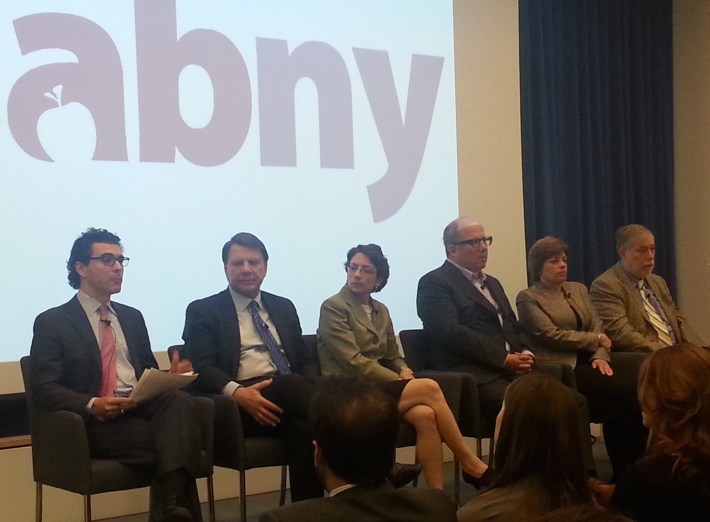
This morning, the Association for a Better New York, a business group, hosted a discussion on the city's infrastructure. The focus was squarely on transportation, and the message wasn't pretty. Panelists warned of dire consequences if elected officials don't act on the precarious state of transportation funding.
Calling himself "the ghost of infrastructure past," former traffic commissioner "Gridlock" Sam Schwartz reminded the audience of the sorry state of New York's infrastructure in the 1980s, when major bridges had to be closed because they were in such poor condition. While things are in better shape today, without attention to maintenance, history could repeat itself. "We can very well have those problems again tomorrow," said Schwartz.
"Back when we rebuilt all those bridges, there was an enormous federal contribution," said DOT Commissioner Polly Trottenberg. Since the 1980s, federal transportation funds have flatlined as the gas tax has stagnated, she said, and "city and state coffers aren’t flowing either."
"Forget about the federal government. Local areas have to fix their problems," Schwartz said, citing Los Angeles as a region where voters have backed major transportation funding measures. "The biggest amount of transit spending in the country is happening in Los Angeles, not in New York."
But Trottenberg cautioned against using Los Angeles as a model. "[Voters] usually tax themselves to build new things. They rarely tax themselves to keep up the old stuff," she said. "At New York City DOT, almost our entire budget is keeping up the old."
It's not just the city that has to contend with aging infrastructure and its maintenance needs. "The Port Authority could spend its entire budget on state of good repair. The MTA’s facing that same challenge," said Chris Ward, executive vice president at the construction firm Dragados and a former Port Authority executive director.
Public-private partnerships, in use for the Goethals Bridge replacement, are often touted as an innovative funding model for governments with tight budgets. "P3s are like the cold fusion discovery," Ward said. “P3s have a role, but there’s not a panacea for a lack of a funding model."
One revenue proposal on the table is the Move NY plan, which would raise $1.5 billion by tolling drivers going to the Manhattan core while lowering tolls on outer-borough bridges with fewer transit options.
Ward said the plan is appealing because it's difficult to sustain ever-increasing charges at existing toll crossings, and he chided elected officials who are already shooting down the Move NY concept without offering reasonable alternatives. "There are a lot of political leaders who are already saying it’s dead on arrival before it’s had a chance," he said. (Last year, Ward's former boss Andrew Cuomo poured cold water on toll reform months before Move NY made its big debut.)
Ward also called for an overhaul of how truck deliveries are handled in New York City. Currently, deliveries are organized primarily by carrier and type of delivery, rather than by geography. The result: One large truck drives around the city to multiple delis, while another makes deliveries to multiple hardware stores. Ward wants to instead organize deliveries by neighborhood.
"It’s incredibly complicated, and you’ll have to deal with federal commerce laws, but the idea is that you create a number of distribution districts within the city and then you regulate it and put it out for bid," he said. By creating delivery districts, the city, state, or Port Authority could gain leverage to reduce truck sizes, mandate safer truck designs, or shift fleets to low-emission vehicles, Ward said.
Other issues panelists brought up today were more immediate in nature. Chris Hamel of RBC Capital Markets was disappointed that authorization for design-build contracts, which the state DOT has credited with driving down costs on the Tappan Zee and Kosciuszko Bridge replacement projects, was not included in the state budget. (There is still a possibility that design-build reauthorization could pass before the legislative session closes out in June.)
Near the end of the event, panelists were asked how ferries fit into the city's transportation future. Trottenberg wasn't too excited about expanding ferry service. "It’s an area where there’s a lot of potential, but so far around the country, ferry service is pretty heavily subsidized," she said. "You need to think about where we get the resources."





